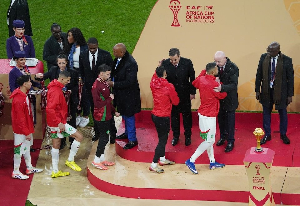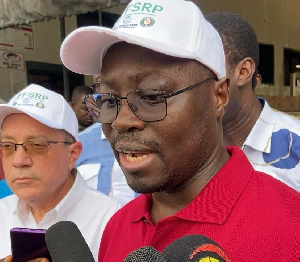Prof Akadu Ntiriwa Mensema is a genre unto herself. She holds the copyright to “what critics have called populist hyperbolic, satirical poetry.” She has managed to carve a unique brand for herself through her imagery-infested satirical treatment of subject matter. If she herself has not succeeded in constituting her image into the conscience of her reading publics as a great public intellectual, her poems have often spoken to us and caused us to think very highly of her. We may not have been quick to prefix her name with the accolade ‘Ace”, as we have done with our popular broadcast journalists. Otherwise, the intellectual has shown so much scholarship and creativity that calling her an ace, at least in that ‘unusual’ field where she alone is master, should by now be a very welcome prospect. Pick any two of her works, and you know why she owns her style: carefully chosen words woven around fact and reality in a way that is only possible when a poet chooses to write in the free verse. When she is spot-on, she is spotlessly assertive.
So, how did our intellectual let anybody down? Well, perhaps, she hasn’t let anybody down, as much as she has let down herself. If Akadu Ntiriwa Mensema meant to rationalise the evil conduct of poor black Africans from our part of the Sahara, who have made 419 a career, conning and duping white folks in some G8 member countries, then she should by now be considering going on intellectual probation, without parole. When I wrote on 419 and Sakawa schemes last week, questioning the sanity of these fraudsters and recommending stiffer prison sentences for them, Professor Akadu Mensema sought to buy a reason to justify their thievery. Akadu turned the tables on me, describing my treatment of the problem as “Bad habit! Think of colonialism.” She left it at that. She did not explain why writing against a criminal trade is bad habit. As we do with her poetry, she wanted us to think about it and school ourselves on the evils of colonialism.
Then, as if God is no King in Israel, Prof Mensema went ahead to yank a paragraph from my story, and planted the entire chunk on my face, hoping that it would pass for an innocent comment. She was generous enough to have left us her name as the author of that deed. The comments section dutifully recorded the exercise. And here, it would serve our purposes to reproduce the exact paragraph that caused Akadu to think back to colonial times when civilisation kicked us in the face and Holy water slapped our cringing brows. The paragraph had read: "Meanwhile in Ghana, internet scam and other 419 schemes continue to taint our national pride. What started as friendly exchange of letters to penpals abroad has today grown into a big industry that employs some of the most ‘ingenuous’ minds around. These penpals, mostly white friends in rich countries abroad, sent their poor friends pens, pencils, and sometimes money, mostly as kind gestures.” It continued “They were not intended to be sponsorship packages, but their poor friends in the Sahara who were smart enough to cook up the most depressing stories about their poverty, often managed to squeeze out some juicy sponsorship packages from their white friends. The very lucky ones got huge financial favours that sometimes provided capital for family businesses. Those in school often got their school fees paid over a long period. Usually, the friendship was ‘consummated’ when their white friends paid them a visit in their poor countries or sponsored them to fly abroad on a visit."
Where does colonialism come in here? So intriguing were Mensema’s comments that a fan of hers left an equally intriguing message in the thread of comments that the article had attracted, questioning why the professor had chosen to ‘cut and paste’ on that occasion, instead of her usual intelligent postings. He had asked: “What’s up woman, are you getting soft lately?” The poet didn’t come back on that; she had led us into the inner recesses of her thinking on colonialism in a single sentence: “Think of colonialism.” She didn’t tell us how we should think? If the academic is endorsing that not-so-clever ‘anti-imperialist’ position that former colonies of the slave-trading Western powers have a right to make a claim on their wealth and take back what belongs to them, then she has succeeded in pushing our development agenda back onto the drawing tables of the colonial master. For, this kind of reparation-seeking protests, nowadays carried out in the form of sustained and institutionalised demands for aids and grants, has not helped our situation very much. The Afropolitans and the Cheetahs (a new breed of African intellectuals who are seeking to put a higher premium on our intelligence, by discouraging our dependency on the West) are constantly on our necks to break free from this line of thinking. The present is ours to change, not the past.
Of course, colonialism and neo-colonialism were crimes against our very humanity. We were quantified into economic units and sometimes made to eat faeces. The master had the right to throw some of his possessions (slaves) into the high seas so that he could claim fat insurance on the loss. Some of us have resisted the temptation to visit any of our slave castles, because we can’t bear to see how those horrific dungeons look like, but we have written about it. It is, perhaps, very ironic that one of the very few of my writings that have been translated into French and Spanish was on the subject of slavery: “200 Years of Slavery, Apologies and A Kiss at a London Theatre.” Slavery being what it is, those bodies that did the translation did not bother to contact me for permission, as if copyright and intellectual property have the same value as a plate of waakye and kahuro.
You would say waakye has a better price than the precious lives of young girls in Cameroon, whose fresh and protruding breasts are ironed by their parents, to ‘flatten’ their chests so that young men would not find them attractive. The practice, which has physically and emotionally scared most of the girls, is supposed to check teenage pregnancy. Other forms of modern slavery have shown in female circumcision and ‘hymen re-vegetation’, that shameless practice in Columbia where prostitution gangs re-stitch the hymen of women to make them virgins again. They are resold to other prostitution gangs for a higher price. Actually, it is known that in some parts of Somalia, nearly two-thirds of the vagina is closed, leaving only a tiny opening for pissing. It makes urinating uncomfortable for women: it restricts the natural flow, so it comes only in small drops. The stitches are removed to open it for entry after marriage. And, of course, some say immigrants from poor African countries who abandon their families and jobs for a better life in the West are in a slavery of a sort. They are not forced to do odd jobs they wouldn’t do, as it happened during the slave trade; but they do these jobs all the same, this time out of care and ‘economic compulsion.’ The numbers pile up each passing day, as extreme poverty grows in the Sahara, where fighting and corruption serve the interest of a few. It is a cycle that is not promising to break, as many of their governments are not meeting their development goals, even with double the aid and grant they receive.
The discontentment is almost palpable. And some of us are not taking it lightly. Not long ago, a British-Nigerian stormed the British parliament to shake the ‘guilty conscience’ of Britain and other nations that profited from the slave trade. He yelled: “This is a disgrace.” The occasion was part of celebrations marking the abolition of slavery. The Queen was in attendance. The Nigerian had protested that the whole ceremony was a waste of our ears, because the damage caused us cannot be wiped away by elephant-size reparations or celebrations of that nature. He was whisked away by the police and security personnel. His name was Toyin Agbetu. He made news, nevertheless.
Did he solve any problem? No! What solves the problem is the approach that folks like MP Ken Agyapong have adopted, letting go the bitter past and sacrificing his personal money and resources to construct some 17 classroom blocks for the education of the pupils of his constituency, and making scholarship facilities available for nearly 60 students. What solves the problem is the encouragement that Dr Mo Ibrahim is giving African governments, awarding the finest leaders cash prizes to prevent corruption and promote accountability. What solves the problem is what Kwaku Adu Gyamfi, a distinguished police officer in New Jersey, is doing for the youth of Asuom. That man is giving his all for Ghana. What solves the problem is the sponsorship packages some selfless young Ghanaian professionals are giving to needy children. If you didn’t know, be reminded that it is now fashionable for a young man to adopt or sponsor one Ghanaian child, or even more. And these are not rich men; they only have enough to help a poor child, as the penpals were doing. I wrote about the boy I have been sponsoring when I was in England. He is now in J.SS. When I visited Ghana in May this year, I picked another one, this time a girl. I wouldn’t wait for Robert Beckford, a researcher and documentary producer at Birmingham University in England, to fly to a village in the Volta region to carry water on his head and buy a uniform for a drop-out school girl. I wouldn’t wait for a white American to come down to construct a toilet for a village in Ghana when I can do it. For that gesture, CNN honoured her among their heroes.
Prof Akadu, must we still think of colonialism in an era of globalisation? Colonialism belongs to the colonial times. We have no right to claim anything from anybody, either through pen friends, sakawa or 419. No amount of 419 or even 410 could buy back that important continental pride that colonialism nearly took away. Only one currency can buy that back: Time. We still have time and opportunity to work things in our favour.
Prof Mensema may want to reread Jared Diamond’s Guns, Germs, and Steel. Being an academic, the Denkyira beauty realises that writing is all about relationships. I realised only a few days ago that Prof Kwame Okoampah-Ahoofe is a close relation to Dr Henry Fosuhene-Sintim, the man I have been calling Akonta since his 10 year marriage to my sister, Solace. Even as I write, I still have an open invitation to the home of the Pryces in the USA, where Daniel has promised some wonderful delicacies for my family.
I am yet to know Prof Mensema beyond her poems. She may find it patronising to hear me call her sweetie or darling. Otherwise, I would say she has been a darling to many on this forum. It is not known if anybody has had a crush on her so far. Well, I did, and it was not because of her beauty; I couldn’t believe her “Think(ing) on colonialism.”
Benjamin Tawiah, Ottawa, Canada
quesiquesi@hotmail.co.uk.
Opinions of Wednesday, 1 September 2010
Columnist: Tawiah, Benjamin














